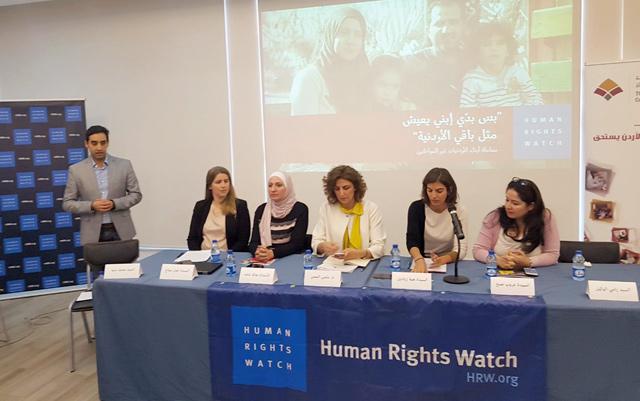You are here
Activists ‘outraged’ at decision to grant citizenship to investors
By Rana Husseini - Feb 21,2018 - Last updated at Feb 21,2018
AMMAN — Activists on Tuesday lashed back at a Cabinet decision a day earlier to grant investors Jordanian citizenship or permanent residency, claiming that the decision was discriminatory and ignored their long-time demands to allow Jordanian women married to non-Jordanians to pass on their citizenship to their spouses and children.
The Cabinet on Monday set several conditions for individuals seeking to obtain Jordanian citizenship, including a zero-interest, five-year $1.5 million deposit at the Central Bank of Jordan (CBJ), or buying treasury bonds valued the same amount at an interest rate to be decided by CBJ and for a period of no less than 10 years.
“This is a provocative decision by the government that allows foreign individuals to obtain Jordanian nationality based on their financial means, while bluntly denying this right to Jordanian women,” said lawyer Noor Imam.
This decision “also comes in favour of rich women, who can now invest and obtain citizenship while the poor do not have this privilege”, Imam told The Jordan Times.
Activists and families of Jordanian women married to non-Jordanians have repeatedly demanded full citizenship rights for their children and spouses.
As it stands now, Jordanian men married to non-Jordanian women can pass on their citizenship to their wives and children, a right that is denied to Jordanian women married to foreigners.
Activist Laila Naffa agreed with Imam, saying that “this step should eliminate all the excuses the government has been giving to the women’s movement to deny the right of citizenship to families of Jordanian women who choose to marry a foreigner”.
Government officials on Tuesday defended the decision as conducive to investment.
Minister of State for Media Affairs and Communications and Government Spokesperson Mohammad Momani said the decision is meant to encourage investment in the Kingdom and boost the national economy.
“Children of Jordanian women married to non-Jordanians have been granted same treatment and privileges to Jordanians to ease up their lives and this decision to encourage investment will be to the interest of their families as part of the Jordanian society,” Momani told The Jordan Times.
The minister stressed that “this decision only aims to support the economy and eventually everyone will benefit from this step, including Jordanian women married to non-Jordanians and their children”.
“The government is always giving excuses in this case, such as wanting to protect the sovereignty of the country, but now they opened the door to anyone who has money to obtain citizenship except the families of Jordanian women who are married to non-Jordanians,” Naffa stated.
She stressed the priority should be given to “these women who are loyal to Jordan and have raised their children to also be loyal to the state”.
Naffa said that Jordan “missed an important opportunity with its decision to give investors citizenship when they could have taken advantage of the decision to announce the same for Jordanian women instead of discriminating against them”.
Tamkeen Fields for Aid’s (TFA) Director Linda Kalash, said: “The decision for investment is good, but the priority should go to the Jordanian women, and citizenship should not be granted based on financial purposes”.
“This is really outrageous and frustrating. Why can’t Jordanian women pass citizenship to their families like the investors?” Kalash told The Jordan Times.
In 2014, the government pledged to ensure the proper application of the “privileges” the government had granted to children of Jordanian women, provided that their mothers had been living in Jordan for a minimum of five years, for at least 180 days per year.
Some of the “privileges” included providing residency permits, the ability to apply for driving licences and real-estate ownership, as well as the availing of benefits in the educational, health, labour and investment sectors.
However, activists and campaign organisers continued to voice concerns that the government did not fully respect its promises, claiming they are still suffering on many fronts from discrimination and complicated governmental procedures when it comes to issuing the documents as promised.
Individuals and entities, who oppose granting citizenship to family members of these women, particularly those with Palestinian husbands, say such a measure will only lead Israel to implement its “ultimate plan of creating a substitute homeland for Palestinians in Jordan”.
Government figures show that there are 88,983 Jordanian women married to non-Jordanians, mostly Gazans, with 355,932 children within these families registered with the Civil Status and Passports Department.
Palestinians, except Gazans, who became refugees after the creation of Israel on Palestinian land, and those who were living in the West Bank when it was occupied by Israel in 1967, have been granted Jordanian citizenship.
Related Articles
AMMAN — Children born to Jordanian women and non-Jordanian fathers still struggle to obtain basic rights and services in the Kingdom, Human
AMMAN — Activists on Thursday said they plan to lobby the Labour Committee at the Lower House of Parliament to amend Article 12 of the Labou
AMMAN — Activists on Wednesday stressed that citizenship rights for families of Jordanian women married to non-Jordanians remain a major dem












